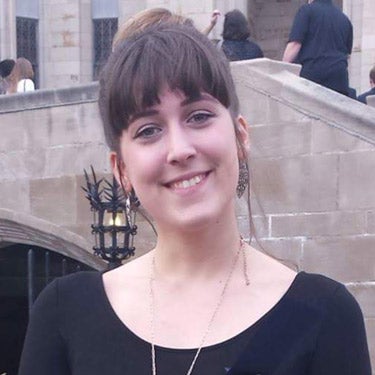 Jeanna Sybert finds meaning in knowledge
Jeanna Sybert finds meaning in knowledge
Growing up as the daughter of two journalists, Jeanna Sybert learned, from an early age, the inherent power of language and words.
But it wasn’t until she arrived at Pitt's Dietrich School that she began to shape and refine how she plans to harness that power. A senior with a double major in communications rhetoric and political science, she also is minoring in film studies – which she initially thought would be her focus.
Sybert, a native of Mars, Pennsylvania, had planned to make movies; but as she took additional classes at Pitt, her interests began to shift. She now plans to attend graduate school in rhetorical studies, with the ultimate goal of earning a PhD and pursuing a career writing and teaching at a research university.
“It’s super interesting because of how prevalent it is,” she says. “Rhetoric is everywhere, all the time. We are constantly confronted by it.”
From social media to advertising to traditional news, the bombardment of information is higher now than ever before. And Sybert’s interest in political science is particularly timely, given the way politicians are using rhetoric to persuade the public, often pivoting important issues.
By mastering the medium, Sybert is able to peel apart arguments, discover motives, and reconstruct how arguments are strengthened.
“It’s a weapon for myself, and a shield to protect myself, in a way,” she says. “It feels sort of like a puzzle at times … it makes rhetoric even more salient.”
For her graduate school writing sample, she expanded on a project she did for Professor Lester Olson’s class in visual rhetoric: deconstructing the widely circulated image of Omran Daqneesh, a young Syrian boy covered in dirt who was photographed sitting in the back of an ambulance moments after his home was destroyed, a dazed expression on his face.
She examined how Western culture constructs a romanticized view of childhood, one that is upset by images of injured or starving children. Through that disruption, people open themselves up to persuasion. But in the case of young Omran, the rhetoric is tempered by the polarizing factors that he is both Syrian and Muslim. Sybert used comments posted to the accompanying article to gauge public response. Was it paternalistic? Did people empathize with the child’s plight, but think his own culture incapable of taking care of him? Or did they demonize the child, speculating that he might grow up to be a terrorist?
Recently, Sybert was recognized as a “highly commended student” in the social sciences: anthropology and cultural studies category by The Undergraduate Awards, an organization based in Ireland that honors undergraduate work across cultures and disciplines. In November, she presented a paper in Philadelphia at the Mid-Atlantic Popular and American Culture Association.
She hopes that and other conferences will help prepare her for an academic career.
“I just want to keep learning. It feels like the meaning of life is to gather as much information and knowledge as possible,” she says.
The fact that rhetoric is in such a transformative period – when social media has become monolithic, completely embedded in our lives – just adds to her excitement for the future:
“The greatest weapon is an idea.”
